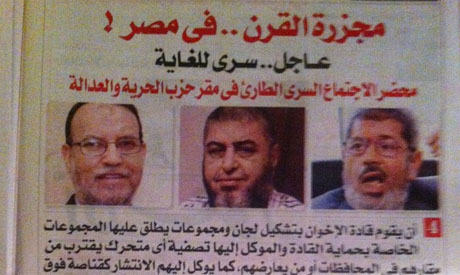 New issues of privately-owned daily Al-Dostour were confiscated from the paper's offices following a decision by the head of Giza primary court on Saturday.
New issues of privately-owned daily Al-Dostour were confiscated from the paper's offices following a decision by the head of Giza primary court on Saturday.
A number of complaints have been filed against the newspaper's chairman Reda Edward and editor-in-chief Islam Afifi, accusing the newspaper of insulting president Mohamed Morsi and inciting sectarian strife in Egypt in the case of the village of Dahshour this month.
Hassan Badie managing editor of Al-Dostour accused the Muslim Brotherhood of being behind the charges and the decision to raid the offices.
"The Muslim Brotherhood's youth have been demonstrating frequently outside the newspaper headquarters," Badie told state-run MENA, describing their alleged actions as a threatening message.
Al-Dostour newspaper is known for its anti-Brotherhood coverage. In one particularly provocative headline, on the 21 June front page, the newspaper declared "The massacre of the century...In Egypt!" The article went on to accuse the top leadership of the Brotherhood-affiliated Freedom and Justice party of cooking up a massacre in Egypt if their candidate Mohamed Morsi failed to win the presidential race in run-offs against Mubarak-era minister Ahmed Shafiq.
The managing editor urged the Press Syndicate to stand by Al-Dostour in the face of the "this fierce campaign against freedom of the press and expression."
A statement published on Al-Dostour's website accused security forces of raiding Al-Gomhouriyya Print House, where the newspaper gets printed. The statement goes on to say that while officers demanded that the print moulds be handed over, officials at the print house refused as they had no permit.
Although many revolutionaries and activists are deeply critical of the editorial policies of Al-Dostour, they are also critical of the judicial moves being taken against the paper.
Ibrahim Eissa, Al-Dostour's former editor-in-chief, sacked in 2010 for his anti-Mubarak views, described the confiscation of the newspaper as a return to "the time of one-party rule."
Eissa was sidelined in 2010 when the newspaper's ownership was transferred to head of Al-Wafd's party Sayed Badawy, and the paper went from being a liberal opposition paper to a regime-friendly publication.
In 2007, Eissa who now acts as chief-editor of Al-Tahrir newspaper, was sentenced to a year imprisonment for "insulting the president," but later pardoned by then president Mubarak.
"We may disagree with the newspaper's editorial, but still our reference will always be freedom of expression," Eissa wrote on his official Facebook Page.
Revolutionary activist Alaa Abdel-Fatah, who spent months in jail last year for opposing military rule, similarly said, "We've been sent to prisons many times for insulting the president, this accusation is a threat to freedom."
Khaled Ali, the former leftist presidential candidate and labour lawyer, has also voiced his opposition to the attacks on Al-Dostour, stressing that freedom of expression and of the press cannot be compromised.
On his Twitter account, human rights lawyer Gamal Eid described the raid as an "attack of thugs."
Eid, who runs the Arab Network for Human Rights Information, wrote, "Whoever justifies beating a journalist for whatever reason and the raiding of press with no legal permit instead of using the law is a thug."
Activist Nawara Negm, who faced military questioning last year, and once described Al-Dostour newspaper as a voice for "the remnants of former regime" also condemned the attack on Twitter saying that "respecting the president will not come by force. A million confiscations will not force us to respect the president if his stances do not command respect."
Last year, the Supreme Council of the Armed Forces temporarily suspended publication of privately-owned liberal daily Sawt Al-Umma for allegedly intending to publish criticism of some military leaders.
Debates around freedom of the press have been particularly contentious in Egypt recently following the announcement of editors-in-chief of state-owned publications by the Shura Council in which Islamists are dominant.
Many journalists and activists voiced fears that this heralded an imposition of an Islamist-dominated agenda on the press.



